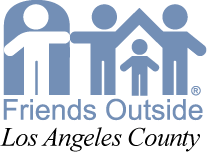 Passport to Success!
Passport to Success!
Are you in a Work Release Program? Would you like to get a job in one of the following?
• Construction (e.g., painter, plumber)
• Warehouse/Manufacturing
(e.g., shipping & receiving, quality control)
• Trade/Transportation (e.g., driver, janitorial)
• Customer Service (e.g., office assistant, sales)
• Hospitality (e.g., front desk, cook)
• Other – you tell us!
Dads Back! Academy F.I.R.E
Dad’s Back! is the signature program of Friends Outside in Los Angeles County (FOLA) and one of our great successes. It’s FOLA’s free program for re-entry dads of all ages and who are out of jail or prison for any period of time.
Korina Bayardo, a former Program Director for Dads Back!, explains four types of classes offered in the program: Parenting/Responsible Fatherhood, Job Readiness/Parole to Payroll, Healthy Relationships/Healthy Marriage and Financial Literacy.
Responsible Fatherhood
5% increase in fathers who are making child support payments/modified payments 79.6% of men increased their frequency of healthy interaction with their children 99% increased their parenting knowledge and fatherhood skills
Healthy Marriage/Healthy Relationships
25% of fathers increased their relationship knowledge and skills 66% of fathers included the children’s “co-parents” in family events
Economic Stability
80% of fathers became employed 85% of fathers increased their “soft” employment skills (e.g., how to interview; how to seek employment in the electronic age) 69.2% of fathers reported a reduced number of employment barriers Korina Bayardo, Program Director for Dads Back!, talks about Job Readiness. It helps former inmates in being job ready, knowing how to talk about their convictions in interviews and creating a solid resume about their experience and skills.
Rashad Ezell, Dads Back! Client in the Job Readiness classes, talks about the the job training that he received from FOLA: Fire Watch, Fire Hole, Hazmat , CPR and First Aid.
Financial Management
100% of fathers increased their financial literacy For more than 40 years, Pasadena-based FOLA has offered no-cost services, including “Parole to Payroll” (an employment program), fatherhood services, support groups, and an after-school program for children and families affected by incarceration. 1 in 100 persons in the U.S. is behind bars, at a cost in California of $50,000 per inmate per year. Unless they receive appropriate services, approximately 60% of them will return to prison. One way that FOLA is turning this around is through its “Dads Back!” program. Funded by the U.S. Department of Health and Human Services, “Dads Back!” helps released fathers to improve their relationships with their children and their children’s mother and to get and keep a job. In other words, provide needed services that help these individuals return successfully to our communities. Korina Bayardo, Program Director of Dads Back!, discusses the trust that develops between Clients and the Case Workers. This trust what keeps them coming back to the program. Success is measured by data that is collected and the trust that is seen when Clients feel free to ask for more help when they need it.
Project imPACT South LA
Project imPACT South La is located on the Los Angeles Trade-Technical College campus. Project imPACT provides comprehensive employment services to justice-involved individuals who also have a mental health and/or substance abuse background, in partnership with the Legal Aid Foundation of Los Angeles and Arming Minorities Against Addiction and Disease.
Incarcerated Parents Program (IPP)
The goal of the “Incarcerated Parents Program” (IPP) – a joint Friends Outside in Los Angeles County (FOLA), The Department of Children and Family Services, Los Angeles Sheriff’s Department Offender Services Bureau and Century Regional Detention Facility program – is to help incarcerated parents develop and maintain positive relationships with their child(ren) during and after incarceration.
Two types of services are available:
- Prevention/Intervention Services: For incarcerated mothers, on a first‐come/first‐served basis;
- Visitation Services: For mothers with a current investigation or case withDCFS.
IPP will reduce the time spent by DCFS Social Workers on cases that involve incarcerated parents because we will do much of the work for you! Program Location: The program will initially be provided to female inmates who are incarcerated in the Century Regional Detention Facility in Lynwood.
Prevention/Intervention Services include:
- Help to ensure the incarcerated parents complete their court‐ordered programs, such as parenting classes(when available).
- Act as a liaison between the social worker and the incarcerated parents.
- Improve outcomes for released incarcerated parents through resource referrals and supportive services.
Target Group
Incarcerated parents with a child(ren) between the ages of 0‐21. Must have a current investigation or case with DCFS, AND who do not have a “stay away” or restraining order in criminal court orin the dependency court which prevents them from having contact with their children.
Visitation services include:
- Supervised visits between the incarcerated parents and their children.
- Preparation of the children and their care givers for the visits, and debriefing with them after the visits.
- Provide reports to you about the visits.
Make a Referral
Contact HSA Lizet Morales at(562) 497‐3512 to request the one‐page referral form.
LA: Rise
A partnership of the City of Los Angeles, County of Los Angeles, and REDF, the LA: RISE Collaboration is a comprehensive partnership that brings together America’s Job Centers of California, social enterprises, and nonprofits to support community members with high employment barriers to acquire and maintain employment. FOLA’s LA: RISE services are co-located at Goodwill Industries’ Northeast Worksource Center in Los Angeles and our role is to support working clients to maintain employment.
Project: Warm Hand-Off (WHO)
Project W-H-O serves recently-released parolees. Along with a “Welcome Home Kit”, clients are provided guidance and peer support to assist with their reintegration back into the community, including connecting them to other needed services such as employment, and housing, and helping them obtain their identification.
